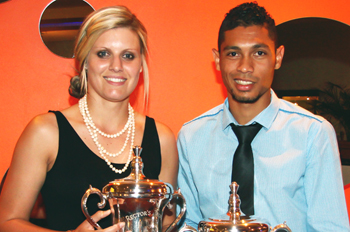Maryka Holtzhausen, Wayde van Niekerk and Driaan Bruwer win Kovsie Sports Star Awards

Maryka Holtzhausen and Wayde van Niekerk
Photo: Hannes Naude
|
Our university honoured our top athletic achievers at the annual Kovsie Sports Star Awards that took place on 23 October 2014.
Maryka Holtzhausen and Wayde van Niekerk were named Sportswoman and Sportsman of the Year respectively.
Holtzhausen captained the Protea netball team that participated in a host of test series and championships. These included:
• a test series against Trinidad & Tobago and England in October last year,
• the Fast Five World Series in Auckland, New Zealand during November 2013, as well as
• the Commonwealth Games in Glasgow this year.
Van Niekerk, in turn, set a new SA record in the 400 m of 44.38 at the Diamond League meeting in New York, USA during June 2014. As a member of the Protea team who participated in the Commonwealth Games in Glasgow earlier this year, he won the silver medal in the 400 m sprint. In August 2014, Van Niekerk clinched the silver medal in the 400 m at the CAA Senior African Athletics Championship in Morocco. He also formed part of the CAA African Athletics team who competed in the intercontinental cup meeting during September 2014. The team won gold in the 4x400 m relay at this event.
The Junior Sportsperson for 2014 is Driaan Bruwer. He was a member of the SA U/19 cricket team that won the Junior World Cup this year.
Our university’s sports stars were honoured in the following five categories:
•
Sportsman and Sportswoman of the Year. Everyone that represented South Africa at a senior level was eligible for the title. The winners each received a trophy and each sportsman and sportswomen in this category were honoured with a medal.
•
Junior Sportsperson of the Year. The winner received a trophy.
•
Sports stars that represented South Africa at senior and junior level. The achievers received certificates.
•
Sports stars that represented the UFS in the national student teams. These sports stars also received certificates.
• Certificates were also awarded to the
KovsieSport Club sports stars.